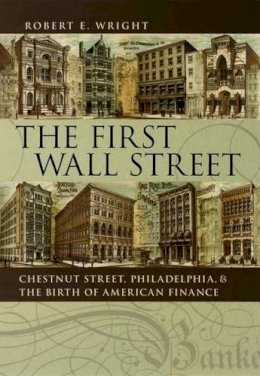20%OFF

Stock image for illustration purposes only - book cover, edition or condition may vary.
The First Wall Street. Chestnut Street, Philadelphia, and the Birth of American Finance.
Robert E. Wright
€ 29.99
€ 23.85
FREE Delivery in Ireland
Description for The First Wall Street. Chestnut Street, Philadelphia, and the Birth of American Finance.
Hardcover. Recounts the of Chestnut Street and its forgotten role in the birth of American finance. It reveals how Philadelphia played a role in the financing of the American Revolution. This book will appeal to those interested in the history of the United States and the origins of its unrivaled economy. Num Pages: 208 pages, 3 line drawings, 9 tables. BIC Classification: 1KBB; KCZ; KFF. Category: (P) Professional & Vocational. Dimension: 237 x 181 x 22. Weight in Grams: 502.
When Americans think of investment and finance, they think of Wall Street - though this was not always the case. During the dawn of the Republic, Philadelphia was the center of American finance. The first stock exchange in the nation was founded there in 1790, and around it the bustling thoroughfare known as Chestnut Street was home to the nation's most powerful financial institutions. "The First Wall Street" recounts the fascinating history of Chestnut Street and its forgotten role in the birth of American finance. According to Robert E. Wright, Philadelphia, known for its cultivation of liberty and freedom, blossomed into a financial epicenter during the nation's colonial period. The continent's most prodigious minds and talented financiers flocked to Philly in droves, and by the eve of the Revolution, the Quaker City was the most financially sophisticated region in North America. "The First Wall Street" reveals how the city played a leading role in the financing of the American Revolution and emerged from that titanic struggle with not just the wealth it forged in the crucible of war, but an invaluable amount of human capital as well. This capital helped make Philadelphia home to the Bank of the United States, the U.S. Mint, an active securities exchange, and several banks and insurance companies - all clustered in or around Chestnut Street. But as the decades passed, financial institutions were lured to New York, and by the late 1820s only the powerful Second Bank of the United States upheld Philadelphia's financial stature. But when Andrew Jackson vetoed its charter, he sealed the fate of Chestnut Street forever - and of Wall Street too. Finely nuanced and elegantly written, "The First Wall Street" will appeal to anyone interested in the history of the United States and the origins of its unrivaled economy.
Product Details
Format
Hardback
Publication date
2005
Publisher
The University of Chicago Press United States
Number of pages
208
Condition
New
Number of Pages
218
Place of Publication
, United States
ISBN
9780226910260
SKU
V9780226910260
Shipping Time
Usually ships in 7 to 11 working days
Ref
99-1
About Robert E. Wright
Robert E. Wright is clinical professor of economics in the Stern School of Business at New York University. He is the author of Origins of Commercial Banking in America, 1750-1800; Hamilton Unbound: Finance and the Creation of the American Republic; and Wealth of Nations Rediscovered: Integration and Expansion in American Financial Markets, 1780-1850.
Reviews for The First Wall Street. Chestnut Street, Philadelphia, and the Birth of American Finance.
"The First Wall Street carefully explores the birth of American finance. A lot of it, like a lot of common law, was directly taken from the British. But there were subtle differences in the American experience from the onset of independence, as we learn in this fascinating book. These included variations in how property was defined, how collateral for loans was determined, how bankruptcy was adjudicated, how banking rules were formulated, and how derivative markets were developed. What Wright reveals, then, is that the American Revolution was about far more than political freedom and liberty. It was about economics as well." - Don L. Coursey. University of Chicago"
